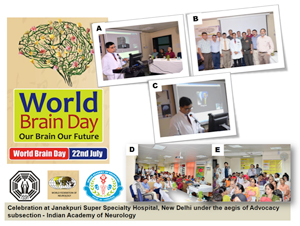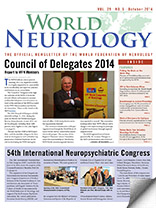By Dr. Man Mohan Mehndiratta, Dr. Natasha Singh Gulati, Dr. Ashok Kumar, Dr. Bhawna Sachdeva and Dr. Madhu Sinha

Figure 1. A: Dr. Man Mohan Mehndiratta, director (JSSH) in India and Prof. Raad Shakir, president, World Federation of Neurology, from London addressing the delegates through video conferencing. B: Expert panelists from various hospitals in New Delhi for World Brain Day at Janakpuri Superspeciality Hospital, New Delhi C: Prof. Mohammad Wasay, chairman advocacy subsection World Federation of Neurology from Pakistan addressing the delegates through video conferencing. D and E: Patients and their caregivers attending the program.
The brain: the body’s most complex organ harbors about 80 million neurons and controls every thought and action1. It can be affected by various diseases and disorders affecting about one billion people worldwide and causing around 6.8 million deaths annually. Neurological diseases and disorders have now been declared as a global epidemic. Knowledge and awareness of brain diseases by individuals and communities can play a crucial role in the prevention, detection and treatment, thus emphasizing outreach public health approach2. Recognizing the magnitude of the burden and disability and mortality consequent to neurological disorders the World Federation of Neurology (WFN) took the initiative to celebrate the first World Brain Day on July 22, 20141. To take this forward and foster brain health in our community, we celebrated World Brain Day (WBD) at our Institute, Janakpuri Super Speciality Hospital (An Autonomous Post Graduate Institute under N.C.T of Delhi) in Janakpuri, New Delhi, under the aegis of Indian Academy of Neurology (IAN). (See Figure 1.) In India, the day was also celebrated in cities like Indore, Nagpur, Kolkata and Bangalore.
Programs like these are very beneficial in a developing country like India where there are many barriers to the neurological education and care such as poor neurologist to population ratio, geographical barriers, illiteracy, lack of trained staff and inadequate resources3. These barriers pose a great challenge to our health care system, which can be overcome by such advocacy campaigns.
The objective of this program was
- To emphasize the types of neurological disorders and their frequency and severity
- To inform that most of these disorders are preventable and curable
- To answer the queries and problems of the patients and their caregivers and understand their needs
- To alleviate the myths and misconceptions related to these disorders
- To serve as a platform for various national and international experts to interact with the patients and their caregivers through video conferencing and panel discussions
More than 250 persons with neurological disorder and their caregivers attended the program and asked the queries related to neurological disorders and patients felt satisfied to get the answer and to interact.
A highlight of WBD celebration was address by Prof. Raad Shakir, president, WFN, from London and Prof. Mohammad Wasay, chairman advocacy subsection, WFN, through video conferencing and distinguished faculty comprising of neurologists, epilepsy surgeon, psychiatrist and neurosurgeon from the public and corporate hospitals. Prof. Shakir and Wasay answered the issues raised by the public and the faculty members had an introduction session with the president.
Dr. Man Mohan Mehndiratta, director (JSSH) and past president, Indian Academy of Neurology, briefed about WBD and its importance, vision and mission of the institution.
Doctors from various hospitals were invited to interact with the patients. Dr. C.S. Meshram, president, IAN, could not make it because of other commitments.
The expert panelists who attended the program include: Dr. Sumit Singh, senior consultant neurologist, Medanta, Medicity, Gurgaon; Dr. Shamsher Dwivedi, Prof. and HOD, Neurology, Fortis Gurgaon; Dr. Anuj Mittal, HOD, Psychiatry, Deen Dayal Upadhaya Hospital, Delhi; Dr. (Brig.) S.P.Gorthi, senior consultant neurologist, R & R, Army Hospital, New Delhi; Dr. Rajeev Anand, senior consultant neurologist, B.L.Kapoor Hospital, New Delhi; Dr. Vikash Gupta, senior consultant, neurosurgeon, B.L.Kapoor Hospital, New Delhi; Dr. Subodh Gupta, neurosurgeon, Deen Dayal Upadhaya Hospital, Delhi; Dr.Solanki, neurosurgeon, B.R.Ambedkar Hospital; Dr. Nilesh Kurwale, epilepsy surgeon, All India Institute of Medical Sciences, New Delhi; and Rehabilitation Experts, JSSH.
The program continued for more than two hours and still the patients had keenness to ask several questions related to various neurological disorders. Patients, rehabilitation experts, doctors, nurses and technical staff joined for refreshment after the event. Initial feedback from patients and their caregivers included appreciation for the program and a number requested more awareness programs in future.
The Internet is a leading source of disseminating public awareness worldwide both for people seeking health information and those who access it for entertainment and social networking purpose as they are passively influenced by health associated content4. The function’s videos and photographs are on the video-sharing website YouTube5 and social networking site Facebook6.
In conclusion: raising awareness is an ongoing effort which is never done so IAN will continue to build strong grassroots movement all over the country to increase public understanding about neurological disorders and diseases to combat this global epidemic. The World Day program in our hospital as well as other cities in India has paved the way for future programs.
References
1. World Federation of Neurology. Fostering quality neurology and brain health world wide. Available at: http://www.wfneurology.org/world-brain-day Accessed on 8th August 2014.
2. Gourie-Devi M. Organization of neurology services in India: unmet needs and the way forward. Neurol India. 2008 Jan-Mar;56(1):4-12.
3. Mehndiratta MM, Mehndiratta P, Gulati NS, Wasay M. Heterogeneity in Neurological Education and care in Asian and Oceanian region. Neurology (in press 2013).
4. England MJ, Liverman CT, Schultz AM, Strawbridge LM. Epilepsy across the spectrum: promoting health and understanding. A summary of the Institute of Medicine report. Epilepsy Behav. 2012 Oct;25(2):266-76
5. World Brain Day Celebration at Janakpuri Super specialty Hospital, New Delhi on 22nd July 2014. Available at: https://www.youtube.com/watch?v=kceBkyP4uHs . Last Accessed on 23rd August 2014
6. World Brain Day Celebration at Janakpuri Super specialty Hospital, New Delhi on 22nd July 2014. Available at: https://www.facebook.com/pages/Janakpuri-Superspeciality-Hospital/465836126847575?ref=br_tf . Posts to page. Last Accessed on 23rd August 2014
Dr. Mehndiratta, MD, DM (Neurology), FAAN, FAMS, FANA, MNAMS, FRCP, FICP, FIAN is the director, professor and head of department, department of neurology at Janakpuri Super Speciality Hospital in Janakpuri, New Delhi. Dr. Gulati, M.D. is the senior resident pathology at Janakpuri Superspeciality Hospital in New Delhi. Dr. Kumar, M.D. is the assistent medical superintendent at Janakpuri Superspeciality Hospital in New Delhi. Dr. Sachdeva, M.D. is the specialist pathology at Janakpuri Superspeciality Hospital in New Delhi. Dr. Sinha, M.D. is the specialist pathology at Janakpuri Superspeciality Hospital in New Delhi.
